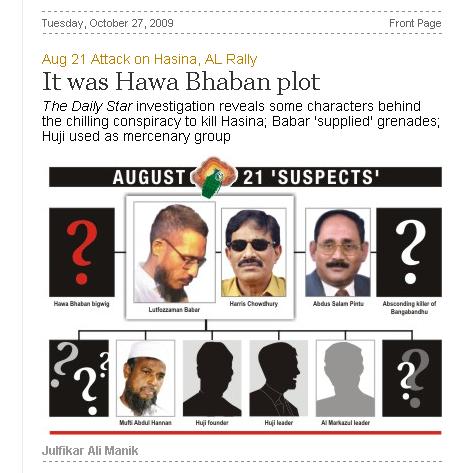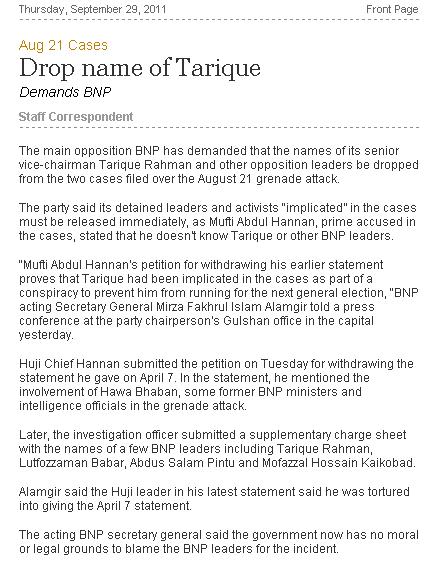
About ten months into the current Awami League government’s tenure, Daily Star produced this sensational investigative report. In blaring headlines, it pinned the blame for the August 21 assassination attempt on Prime Minister Sheikh Hasina on Tarique Rahman (referred to as Hawa Bhaban bigwig in report), and some other BNP leaders. The assassination attempt was billed as a joint venture between BNP and an Islamic fundamentalist organization.
The timing of this report was extremely significant. Two years ago, it was quite common to hear predictions about BNP breaking apart or an end to the Zia-brand of politics. Rovian dreams of Awami League’s permanent majority was quite du jour. BNP was scheduled to have its annual party council at the end of 2009. A feasible connection between Tarique Rahman and a murder charge would not only put BNP’s leadership transition into question, it would have given the government a huge bargaining chip against the largest opposition party.
Julfikar Ali Manik claimed that a “highly privileged document” from “a top accused of the grenade carnage” was the source of this information. This document finally went public on April 7 2011, when Mufti Hannan was brought in front of a magistrate to give a confessional statement that mirrored exactly what the 2009 Daily Star report had claimed. Important to note, Hannan had already confessed to his own involvement in this crime back in 2007. This additional information was only to pave the way for Tarique Rahman and other BNP leaders to be also indicted for the same crime.
Fast forward to September 27, less than a week ago. Having involved everyone the government wanted to involve, the case starts. Mufti Hanna submits a document stating that his supposed confessions were extracted by torture. How does Daily Star cover the story?

It buries the retraction deep into the story. Which is funny, because the news that the government allegedly extracted a confession from a prisoner in its custody, only so that it can frame opposition politicians, ought to be big news. Amar Desh has reproduced the entire petition, including description of the torture. Eyebrows have been raised for less.

The next day, BNP, quiet understandably, held a press conference claiming vindication and pressing for the name of its leaders to be dropped from the charge-sheet. Again, in the headline, Daily Star made no reference to the alleged retraction. A casual reader glancing at the headline, as I did, would have probably thought it referred to some garden-variety claim made in some rally somewhere, and missed this entire back story.
In an incredible counterattack, to make sure the retraction of the confession was downplayed, Daily Star printed a competing news article claiming that Hannan’s legal petition had no standing. The next day, it got eminent jurist State Minister for Law Quamrul Islam to say the same thing.

Let us look at the legal claims that a confession given under Section 164 cannot be retracted. Section 164 (3) of Bangladesh’s Criminal Procedure Code states:
(3) A Magistrate shall, before recording any such confession, explain
to the person making it that he is not bound to make confession and that if he does
so it may be used as evidence against him and no magistrate shall record any such
confession unless, upon questioning the person making it, he has reason to believe
that it was made voluntarily; and, when he records any confession, he shall make a
memorandum at the foot of such record to the following effect :-
“I have explained to (name) that he is not bound to make a confession and that, if he
does so any confession he may this confession was voluntarily made. I was taken in
my presence and hearing, an was read over to the person making it and admitted by
him to be correct, and it contains a full and true account of the statement made by
him.
(Signed) A. B.,
Magistrate.”
This makes abundantly clear that voluntariness is at the heart of any confession obtained through Section 164. The fact that confessions extracted through torture are illegal are no surprise; the courts of Bangladesh have been very exact in this regard. Our Supreme Court has explicitly held, in State Vs. Abul Hashem, 3 MLR (HCD) 30, that a magistrate cannot record a confession that is extracted through torture. And then, just to make sure, the magistrate has to affix his own signature at the end, verifying that the statement was not produced through torture.
What factors should a court look at to see whether there were any indication of torture or general police coercion? One very important factor is whether the confession is extracted after being in police custody, or whether there is any possibility that the witness may be taken back to remand right after his interaction with the magistrate. In State Vs. Farid Karim, 8 BLT(AD) 87, the fact that the accused was in police custody for unexplained two days before the police produced him for making confessional statement, was one of the important factors in the confessional statement being found involuntary.
Has Mufti Hanna been taken in custody, also called remand, often? According to a very desultory Google search, he has been remanded for 7 days on September 6, 2009, 5 days on September 12, 2009, 3 days on September 23, 2009, for 7 days on December 3, 2009, for 3 days on July 18, 2010, 2 days on August 22, 2010, and 5 days on December 27, 2010 . After making the statement, he was remanded for 1 day on April 26, 2011. That makes for 32 days of remand, and potential police torture, before and 1 day after making this confession statement. During the remand hearing held on August 22, 2010, Hannan tallied the number of days for which he had been in remand at 369 days over the past five years, and begged the magistrate not to grant any more remand. Remand, though, was granted.
Hanna was in police remand for half of September 2009. Presumably, it was this during this period that the document which became Julfikar Manik’s investigative piece was produced.
Even if this confession was made through torture, should we care if such confession statements cannot be retracted? Yes. There exists a plethora of judicial opinion, specifically State Vs. Lalu Miah and another, 39 DLR(AD) 11, which holds that any allegation of torture which forced the confessional statement, is to be treated the same as a petition for the withdrawal of the statement. Now that Hannan has claimed torture in police custody, the judge must decide whether his earlier confessional statement is credible. So the claim that there is no legal basis for withdrawing his confessional statement is without merit.
So why is this about the Daily Star’s coverage of this whole issue, rather than the much serious issue of torture of a prisoner in government custody, in a conspiracy to subvert the opposition political forces. There are two main reasons. The first is that we hear about these human rights violations through newspapers, and especially the Daily Star. If not for the Daily Star, Limon would be rotting in a jail cell or dead by now. So, when the newspaper itself decided to obfuscate the story and shift the focus to legal technicalities like getting permission from jail authorities instead of the much bigger and more serious allegation of torture in government custody, it renders hollow its supposed commitment to human rights and reinforces the suspicion that the news printed in Daily Star is slanted to serve a particular agenda.
Secondly, torture does not occur in a vacuum. No torture can flourish in a society unless it decides, as a whole, that certain individuals or classes of individuals are exempt from the protection of law. It very much seems like Daily Star has made such a finding for Mufti Hannan, which makes the paper, in general, and the relevant individuals, in particular, accomplices to torture. And the insidious thing is that the class of people who can be tortured tends to grow and metastasize at unbelievable speed. You may think that it only includes people with beards, and then suddenly, it also includes young university students out at night.
This saga is by no means over. While there is an aspect to it that has a purely partisan aspect, this incident also serves as a reflection of the values that we hold as a society. And those values are fraying fast.





